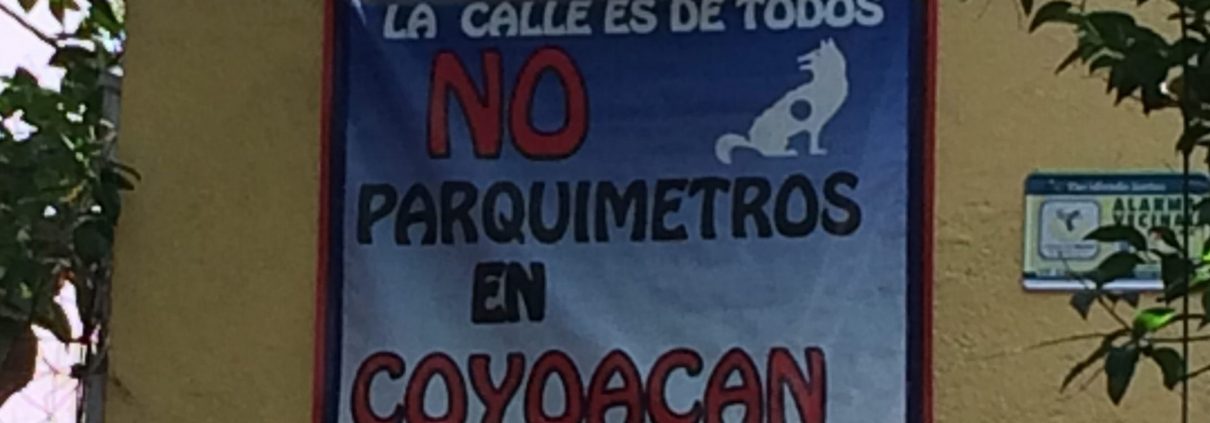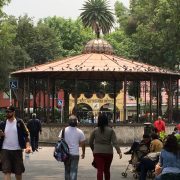‘Don’t Privatize My Private Property’
By Jordan Fraade, MURP ’17
Every day, I see them on the streets of my neighborhood: Men wearing baggy t-shirts and baseball caps, standing guard over every inch of curb space they can find, waving red washcloths and shouting “Viene, viene!” to passing drivers. For those accustomed to the sacred right of free on-street parking, Mexico City’s franeleros are a shock to the system. Independent of the government, they establish control over curb space in neighborhoods throughout the city. They guide drivers into empty spaces, hold onto the keys and guard the car while the driver is gone, and charge a fee for the service. Mexico City residents are divided on whether this fee is a tip or merely extortion (“Nice car you’ve got there. Would be a shame if something happened to it”).
Many drivers see franeleros as parasites who commandeer free public space for private gain (check the comment section of any article for a taste of the hatred). There’s no question parking in Mexico City is chaotic and poorly managed. But are the franeleros a symptom or a cause of this? A couple of years ago, the city proposed installing parking meters here in Coyoacán, a beautiful neighborhood with colonial streets, popular food and nightlife, and severe parking problems. The backlash was immediate and city leaders gave up on the plan, but signs opposing parquimetros can still be seen hanging from balconies. “La calle es de todos,” they say — “The street belongs to everyone.” “Vecino, no dejes que privaticen tu calle” — “Neighbor, don’t let them privatize the street.”
And, suddenly, theory becomes practice. This past winter I took a course with Donald Shoup, UCLA’s “parking guru” who has changed the way urbanists look at parking. His ideas on the value of curbside parking provide a perfect explanation for what’s happening in my neighborhood. Shoup believes urban on-street parking is systematically underpriced. In keeping with the concept of supply and demand, when a scarce resource is given away for free, it creates excess demand for these spaces and causes traffic congestion, air pollution, and safety risks. The only way to solve this problem is to treat curb parking like we would any other economic good — charge a fair market price for it, and require drivers to pay for what they use.
 Shoup’s argument centers on the economic benefits of charging a fair market price for curb parking, but here in Mexico City, free parking is also very much a matter of social equity. “Cochetitlán” (Car City) may be one of the city’s nicknames, but private cars only account for a small portion of the trips made in the city — between 20% and 33%, depending on whom you ask. The vast majority of residents travel by public transportation, bike or foot. Nor are cars distributed equally among Mexico City’s population. As Shoup notes in the preface to a report on parking meters in Mexico City, “less than half of the households in the city possess an automobile, and households with an automobile on average have more than twice the income of those without.”
Shoup’s argument centers on the economic benefits of charging a fair market price for curb parking, but here in Mexico City, free parking is also very much a matter of social equity. “Cochetitlán” (Car City) may be one of the city’s nicknames, but private cars only account for a small portion of the trips made in the city — between 20% and 33%, depending on whom you ask. The vast majority of residents travel by public transportation, bike or foot. Nor are cars distributed equally among Mexico City’s population. As Shoup notes in the preface to a report on parking meters in Mexico City, “less than half of the households in the city possess an automobile, and households with an automobile on average have more than twice the income of those without.”
When I see signs in my upper-middle-class neighborhood that warn against “privatizing the street,” I think of those statistics. As far as I can see, the streets of Mexico City have already been privatized twice. First, a disproportionately wealthy minority has been allowed to store private property on public streets for free, taking up space that if it were truly public would belong to pedestrians, merchants, cyclists and all members of the neighborhood. Second, franeleros further privatize this space by commandeering sidewalks and charging drivers to park in free spaces, with the implicit threat of violence if they don’t pay up. I’ve asked a lot of residents in my neighborhood how the franeleros operate — whether they have some sort of unwritten agreement with the government — and how the money gets distributed. Everyone has given me a different answer. But whatever the details, I don’t believe parking meters would do anything that free street parking and franeleros haven’t already done.
At the same time, I’ve come to understand why so many Mexico City residents treat parking meters with suspicion. In his book The High Cost of Free Parking, Shoup discusses how Pasadena, Calif., installed parking meters in its historic downtown but earmarked the revenue for community improvements. In Pasadena, almost all meter money was invested back in the neighborhood. Here, in contrast, parking meters are operated by a private concessionaire that collects 70 percent of the revenue, leaving only 30 percent for local improvements. A Vice News investigation found little transparency regarding this 30 percent, and since I’ve been here, I have quickly learned that when Mexicans express a fear of government corruption, I should check my U.S.-bred assumptions at the door. A scenario that I’d dismiss as a conspiracy theory back home is a perfectly well-founded fear here — even when the end goal is better, safer streets.
In my first blog post on my summer work I mentioned the many similarities I see between Mexico City and Los Angeles, so this raises an obvious question: Will franeleros be coming to L.A. soon? My guess is no. Many aspects of their work don’t translate well to a U.S. context: Franeleros rely on a high degree of economic informality (i.e. lack of regulation), which is more pervasive in Mexico than in the U.S. Mexico City also lacks Los Angeles’ sea of surface parking lots, so competition for street spaces is even more fierce. But the core pattern is the same: treating a scarce, valuable resource as an entitlement, and forcing the car-free to subsidize drivers. They may not be franeleros, but as long as Los Angeles stays wedded to the idea of free parking, someone will come along and figure out how to game the system.












